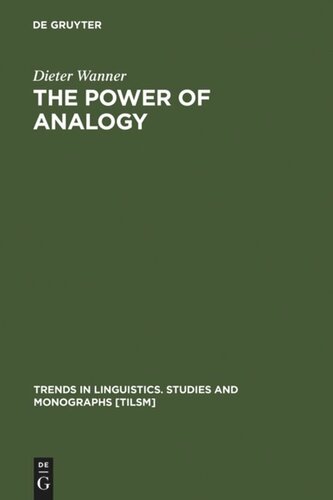

Most ebook files are in PDF format, so you can easily read them using various software such as Foxit Reader or directly on the Google Chrome browser.
Some ebook files are released by publishers in other formats such as .awz, .mobi, .epub, .fb2, etc. You may need to install specific software to read these formats on mobile/PC, such as Calibre.
Please read the tutorial at this link: https://ebookbell.com/faq
We offer FREE conversion to the popular formats you request; however, this may take some time. Therefore, right after payment, please email us, and we will try to provide the service as quickly as possible.
For some exceptional file formats or broken links (if any), please refrain from opening any disputes. Instead, email us first, and we will try to assist within a maximum of 6 hours.
EbookBell Team

4.0
86 reviewsIn The Power of Anology, Dieter Wanner argues for reinstating historical linguistics, especially in (morpho-)syntax, as constitutive of any theoretical account of language.
In the first part, he provides a critique of some foundational concepts of an object-oriented linguistic perspective, questioning the distinction between synchrony and diachrony, dichotomous parametrization, grammaticality judgments, and formal generalization. Instead, the immanent perspective of the linguistic individual, licensed by broad cognitive functions, highlights such relegated dimensions as similarity, (surface) redundancy, frequency of form, and social and environmental conditions on language use.
In the second part, Dieter Wanner relies on a systematic construct of analogy as the dynamic force enabling language, tying together acquisition, language use, and linguistic change. Such analogy is pervasive, driven by local models, and inevitably spreading through the social web of linguistic practice. The unpredictability, incompletion, and typical slowness of change thereby become the norm, while categorical closure remains a marked possibility. The framework of "Soft Syntax" spells out an operative model for syntax relying on precedence, cohesion, dependence, agreement, constructional identity, and concatenation. These six dimensions and their interplay undergo a detailed exploration of their diachronic operation and implications, applying them to typical examples taken from the history of the Romance languages.
The openness of the framework enables diachronic linguistics to approach old problems in a new light and to ask new questions about the mechanics and nature of language change.